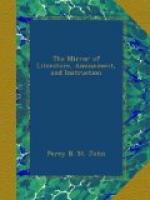The vastness and multiplicity and complexity of the organization by which the movements of the capital proceed, as it were mechanically, do not act merely by diminishing the general importance of individuals to the system. Except in the case of very happy, and universal, and flowing natures, or under the influence of accidental counteractions, a personal risk, between extreme vagueness and extreme narrowness of character, is incurred by the individual himself. In respect of employment, the division of intellectual labour is so complete, that most persons in such a situation are tempted to do their own piece of work, and no more;—to rest satisfied with manufacturing the pin’s head which happens to have fallen to their share. Does a London life tend to quicken the moral pulse and expand the heart? The forms of society are thrown into too large a scale, and its pace is too rapid, to afford an opportunity for the sort of intercourse by which alone a real acquaintance with, understanding of, and affection for, each other can be obtained. No means exist of getting there at any thing further than talents in men, and beauty or accomplishments in women.
Qualities which can be exhibited as a show are discovered and appreciated accordingly. But wisdom and virtue, which are to the mind what breath is to the body, have no part assigned or assignable to them on such a stage. A man may pass a life in London without an occasion arising by which his neighbours can learn whether he is an honest fellow or a rogue. The consequence is, that a good deal of such a man’s moral nature gets imperfectly developed, and dies away. The appropriate object is not brought sufficiently close and home to him to stimulate and call forth his latent powers. Charity is perhaps better off than most. By a satisfactory compromise, it falls into the hands of a mendicity society. But there are other virtues which do not admit of being compounded for, and their burden transferred to a committee, for two guineas a-year. In these cases the moral tax is too often evaded altogether. We are well aware that men of pleasure are far from being the only persons who have turned into a maxim of life the sentence which the Duke of Buckingham passed upon the dog which barked after him,—“Would to God you were married and settled in the country!” It is evident that the word provincial is often felt, by characters of a higher strain and object, to imply an imputation or admission of mediocrity. Now, greatly as nations differ, it is generally admitted that all capitals are pretty much alike. It follows therefore, that the characteristic spirit and principle of a nation do not appear there to most advantage. Enow worthy representatives of that spirit and principle are doubtless there; but they are there too much as though they were not. It is an atmosphere which no individual powers can penetrate, and where it needs more than an ordinary sun to make itself felt or seen.




